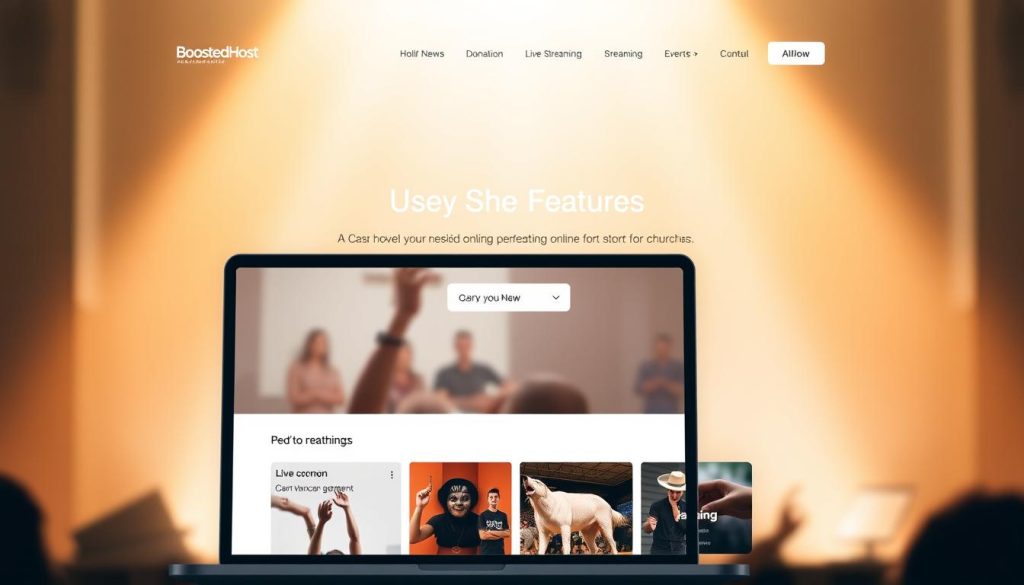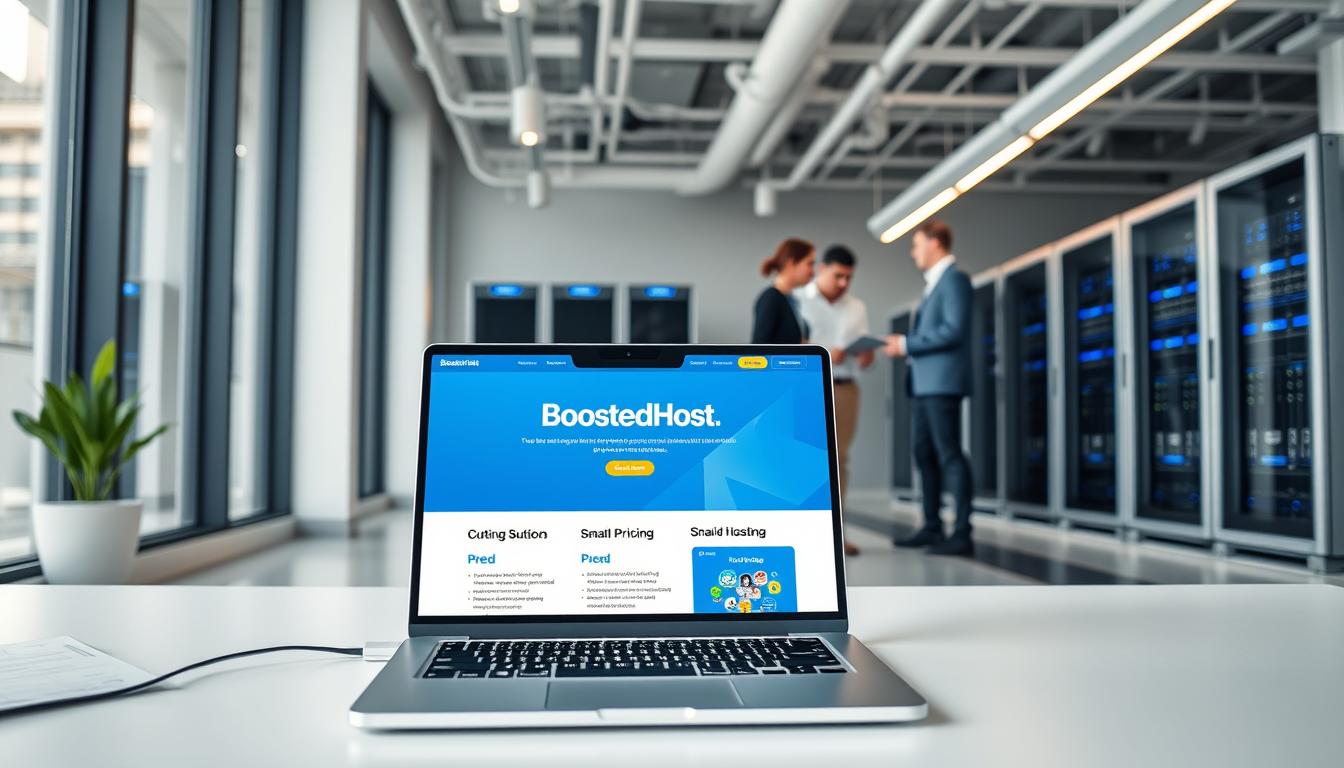Over 60% of congregations now stream services each week, and many see a clear lift in outreach when their site can take donations and list events easily.
You’re here to find a practical way to launch a modern website that handles livestreams, donations, and events without draining your time or budget.
In 2025, you can pick an all-in-one builder to move fast or a flexible plan that scales as your visitors grow.
This guide rounds up real providers used by ministries so you can choose based on features and pricing, not hype.
Expect clear picks for design-first needs, ecommerce and fundraising, budget options, and fast web hosting that keeps your site online when it matters.
Key Takeaways
- Choose a path that matches your team’s skills — builders for speed, managed platforms for scale.
- Look for built-in donations, livestream tools, and calendar features to save setup time.
- Compare actual plan names and annual prices before you commit.
- Prioritize backups, security, and uptime so new people have a smooth visit.
- Find a balance between templates that match your mission and flexibility to grow later.
Why your church website hosting choice matters in 2025
Your site’s platform decides how smoothly video, donations, and event signups work when traffic spikes. That matters because busy Sundays and holiday services bring peaks in visitors and stress on servers.
Reliable website uptime (think 99.9%+), SSL, and daily backups protect sermons, registrations, and giving data. Strong security and backup routines mean fewer emergencies and faster recoveries.
Good support shortens the time you spend troubleshooting. A responsive team reduces volunteer hours and keeps your marketing and service pages live when people need them.
- Tool consolidation: donations, events, email, and media under one roof saves logins and time.
- Scale: pick website hosting that grows with your team and tech without slowing ministry momentum.
In short, choose a stack that protects trust, cuts work for your team, and gives a clear guarantee your church website will be there when people look for you.
How we evaluate church website hosting
Start by checking how a platform streams services, collects gifts, and manages event RSVPs when traffic spikes. We run tests that mimic Sunday peaks so you see real limits, not marketing claims.
Livestreaming and sermon media
We measure uptime, upload limits, and whether video is embedded or hosted off-site. For example, Wix limits free streams to ~10 minutes and premium plans extend sessions, so you need to match session length to your service schedule.
Donations and tithing
Native forms get top marks for simplicity. We also review app ecosystems like Shopify’s Easy Donation, fee transparency, and how quick it is to add a Give button that donors recognize.
Events and scheduling
Built-in bookings, calendars, and RSVP flows reduce no-shows and save your team hours. Squarespace’s Acuity shows how an add-on can handle classes and small groups starting around $16/month (annual).
Ease of use, performance, and support
Ease of use covers onboarding, AI page tools, and email setup so volunteers publish fast. Performance checks look for SSL by default, daily backups (WP Engine does this well), and caching tech like SiteGround’s SuperCacher.
Finally, we weigh response times and real-world reputation. Quick support is your practical guarantee when sermons or events must load without fail.
- Functionality: does the platform include the features and tools you need?
- Collaboration: how many users can edit, and is email integration simple?
- Pricing: plan tiers, trials, and add-on costs compared to functionality you actually use.
Top quick picks at a glance
This snapshot helps you narrow options fast so you can choose a practical website path that handles livestreams, donations, and events without extra setup time.
Best overall: Wix — donations, livestreaming, and 17+ church-ready templates
Why it works: an all-in-one website builder with native giving and video tools plus AI-assisted templates to get you live quickly.
Best for stunning designs: Squarespace — polished templates and Acuity Scheduling
Squarespace pairs refined pages with scheduling for classes and groups. The 14-day trial helps you test layouts and booking flows.
Top pick for selling and fundraising: Shopify — robust ecommerce with donation apps
Shopify powers stores and donations at scale, with plugins for giving, ticketing, and payments.
Top value: Hostinger — low-cost plans and simple builder
Hostinger gives a budget-friendly way to launch a small site without sacrificing basic website hosting features.
Support-focused: SiteGround and WP Engine
SiteGround brings fast WordPress performance and responsive support. WP Engine offers managed WordPress with quick restores and strong security.
Fastest setup: GoDaddy — AI-assisted build and built-in email marketing
GoDaddy is the quickest route from zero to live when people need a simple web presence and basic marketing tools.
Wix: Best overall for church websites
Wix packs the most useful tools into a single dashboard so your website can run livestreams, accept donations, and manage events without stitching together several services.
Key features you’ll use: donations, Members Area, video and livestreams
You can get started fast with 17+ religious templates or let Wix’s AI generate page content and layout. Add a Members Area to share sermon notes and gated content with regular users.
Wix Video supports uploads and livestreams; free plans limit streams to short sessions while paid tiers extend sessions up to about three hours. Donations are native on paid plans so your Give CTA, recurring gifts, and thank-you flows live on the site.
Templates and AI: religious designs or build with AI
The design options speed setup, but note a major caveat: once you publish, you cannot switch templates without rebuilding pages. Choose your theme early or expect a rebuild if you pivot later.
Pricing in 2025: free plan limits vs Core sweet spot ($29/month billed annually)
The Core plan at $29/month (billed annually) is the common sweet spot for small ministries. It unlocks ecommerce if you sell merch or tickets and removes free-plan limits on video and donations.
Where Wix shines—and where it’s rigid
- Strengths: built-in tools for sermons, events, email marketing, and bookings that help volunteers publish content faster.
- Limits: template switching is rigid; some advanced functionality may require apps or workarounds.
If you want a single website builder where features just work together, Wix is a solid choice that balances functionality, design, and support. For a wider comparison of church website builders, see church website builders.
Squarespace: Best for design-first church sites
C For teams that care about layout and image-first pages, Squarespace helps you launch a modern site with little fuss.
Beautiful templates and flexible sections make it easy to assemble pages that highlight sermons, staff, and upcoming events. Drag-and-drop blocks let you add contact forms, media, and people profiles in just a few clicks.
Powerful scheduling and bookings
Acuity Scheduling integrates for classes, small groups, and event RSVPs. Plans start at $16/month (billed annually), so you can manage sign-ups without juggling calendars.
Pricing and trials
Squarespace pricing runs $16–$99/month with a 14-day free trial. The trial gives you time to build pages, test email sign-ups, and preview how sermons and event pages appear to users.
Workarounds and extras
There aren’t church-specific templates, but you can adapt community or non-profit designs and swap imagery to match your ministry. For multilingual needs, use extensions like Weglot to translate sermons and announcements.
- Quick wins: clean design, simple content tools, and easy email sign-ups.
- Note: advanced features may need paid add-ons, so review pricing before you launch.
Shopify: Best for churches selling online and taking donations
When your site needs real ecommerce plus donation options, Shopify gives you a single dashboard to manage sales and gifts.

Apps that matter: Easy Donation, Appointment Booking, and chat
Easy Donation plugs into checkout to accept one-off and recurring gifts (plans start around $6.99/month). Use a booking app like Cowlendar for pastoral meetings and classes; a free tier covers basic RSVPs.
Costs to plan for: $29-$299/month plus app fees
Shopify plans run $29–$299/month (billed annually). Expect add-on fees for donations, scheduling, and advanced chat. Map your needs first and set a clear price cap before you add apps.
Template limitations and how to keep costs under control
There are only a dozen free themes, so pick a clean layout and strong product naming to avoid extra design work. Use built-in marketing and email tools to promote campaigns without extra tech.
| Item | Typical Cost | Role | Notes |
|---|---|---|---|
| Shopify plan | $29–$299/month | Ecommerce platform | Core platform for sales and ticketing |
| Easy Donation | $6.99+/month | Accept gifts | Native checkout integration |
| Appointment app | Free–paid tiers | Scheduling | Handles classes and pastoral bookings |
| Chat & marketing | Free–varies | Support & outreach | Email and chat extend visitor engagement |
- Who this fits: a church that runs merch, ticketing, or a store alongside donations.
- Tip: keep functionality lean to control monthly price and maintain a smooth experience for visitors.
Hostinger: Budget-friendly hosting for small churches
If your team needs a low-cost, no-friction route to a tidy church website, Hostinger is an option to consider. It pairs affordable plans with a simple builder so you can publish sermons, schedules, and giving links fast.
Low monthly pricing and an easy site builder
Price promotions can start near $2.69/month with coupons, which keeps your operating cost low. The included site builder and SSL get your pages secure and live without extra steps.
Values and content policies aligned with ministries
Hostinger enforces content policies that block illegal, adult, and gambling material. That alignment helps ministries avoid shared-server content that conflicts with their values.
Who should choose Hostinger over a builder
Pick this if you want more control than a closed builder but still want a friendly path to publish. You get basic security, email setup, and support when you need help.
| Feature | Typical Offer | Why it matters | Good fit if… |
|---|---|---|---|
| Price | $2.69+/month (promo) | Keeps operating costs low | You have a tight budget |
| Site builder | Included | Fast setup for pages and sermons | You want quick publishing |
| Security & SSL | SSL included | Protects visitors and donations | Security basics are required |
| WordPress on-ramp | Easy upgrade | Scale into CMS later | You may grow to a bigger site |
SiteGround and WP Engine: WordPress hosting for speed and stability
If your ministry runs WordPress, pick a host that boosts performance, automates safety, and lets your team move quickly.
SiteGround: performance boosts, backups, and great support
SiteGround speeds up WordPress with built-in caching (SuperCacher), daily backups, and responsive support volunteers appreciate.
Promo pricing can start low, but the real win is consistent uptime and practical documentation that helps your team publish sermons and events without delays.
WP Engine: managed WordPress with simple rollbacks and tight security
WP Engine simplifies complex work with one-click backups and restores, staging sites, and hardened security for content-heavy websites.
If an update breaks a page, quick rollbacks get you back online before the weekend service. That reliability fits growing ministries with heavier traffic.
When managed hosting beats a website builder
Managed plans shine when your site needs advanced performance or business processes that builders struggle to support.
Daily backups protect your content library. Email-friendly guides and strong support help your team ship updates with confidence.
Choose SiteGround for value and hands-on help; choose WP Engine when your church website demands enterprise-grade resilience.
GoDaddy: Quick setup for basic church websites
If you need a crisp, no-friction website in a day, GoDaddy’s builder speeds the whole process. The platform focuses on fast delivery so volunteers can publish service times and announcements without a long learning curve.
AI-assisted build, email marketing, and online payments
AI-assisted site creation helps you pick a layout and fill core pages quickly. Built-in online payments let you add a giving link or ticket checkout the same day.
Email marketing tools are part of the package, so you can send devotionals, event reminders, and follow-ups to new guests without extra apps.
Where GoDaddy saves time—and where customization is lighter
Plans run about $9.99–$20.99/month billed annually, which keeps costs predictable while you get a working site fast.
- Easy theme switching means you can test different looks without rebuilding.
- Customization depth is lighter than design-first builders, so complex layouts may feel limited.
- Built-in tools cover essentials, leaving you free to spend time with people rather than on site edits.
In short: choose GoDaddy when speed, simple payments, and strong email tools matter most. It’s a practical way to get an online presence live now and refine the design over time.
best hosting for churches: builders vs traditional web hosting
Deciding between an all-in-one website builder and a traditional WordPress platform comes down to speed versus control. Your timeline and volunteer skill set shape which path fits your ministry.
Website builders (Wix, Squarespace, GoDaddy): speed and simplicity
Website builders bundle donations, livestream tools, and event pages so you can launch fast. They remove many setup steps and cut maintenance work for volunteers.
Traditional hosting + WordPress (Hostinger, SiteGround, WP Engine): control and scalability
Managed WordPress gives deeper functionality through plugins, advanced forms, and custom workflows. You also get configurable backups and stronger security options as traffic grows.
When each path makes sense for your team and timeline
Pick a builder when you need a site live this week and the team prefers low-tech upkeep. Choose WordPress hosting if you plan a multi-year digital strategy with custom integrations and tighter performance needs.
- Quick launch: builder — fast, integrated features.
- Long term: web hosting + WordPress — control, plugins, and scale.
Either route supports strong church website hosting; the real choice is the one your people can maintain week after week.
Pricing and value comparison you can act on today
Focus on what each plan actually gives you in year one, not just the promo rate. Below is a compact way to weigh cost against real features so you can get started without surprises.
Quick price snapshots
- Wix: $17–$159/month (billed annually). Donations unlocked on paid plans; Core (around $29/month) is a common sweet spot.
- Squarespace: $16–$99/month with a 14-day free trial — good balance of price and design polish.
- Shopify: $29–$299/month; expect app fees for donations and booking on top of the base price.
- Hostinger: very low entry promos (~$2.69/month) to move from a basic site into fuller website hosting.
- SiteGround: competitive WordPress plans (promos often near $2.99/month) with performance perks.
- WP Engine: premium managed plans (~$22.50/month with coupon); includes enterprise features and easy restores.
- GoDaddy: $9.99–$20.99/month with solid email and marketing tools included.
| Provider | Typical monthly price (annual) | Value note |
|---|---|---|
| Wix | $17–$159 | Native donations on paid plans |
| Squarespace | $16–$99 | Design + 14-day trial |
| Shopify | $29–$299 | App fees add up |
Practical tips: compare renewal price and email limits, tally app fees, and pick a plan with a clear trial or guarantee so you can test the website before long-term commitments.
Match the right platform to your church’s needs
Match your church’s goals to a platform so your team spends time on people, not tech.
This short guide helps you pick the right option based on scale, skills, and goals. Use the snapshot below to decide where to get started and who will update pages weekly.

Small churches and first sites: Hostinger or GoDaddy
Why: fast setup, low cost, easy email and basic website tools your volunteers can run.
Design-forward ministries: Squarespace
Why: polished templates and simple editing so your pages look modern with little tech lift.
Donation-first with livestreams and members: Wix
Why: built-in giving, members areas, and video tools keep donations and media under one roof.
Merch, bookstores, and ticketed events: Shopify
Why: ecommerce-ready checkout and apps make sales and ticketing smooth. Budget for apps.
Content-heavy and growing teams: SiteGround or WP Engine
Why: scalable web hosting, daily backups, and workflows that support many editors and large content libraries.
| Platform | Use Case | Key benefit |
|---|---|---|
| Hostinger / GoDaddy | First site, budget | Quick launch, simple email |
| Squarespace | Design-focused | Polished templates, easy editing |
| Wix | Giving + livestreams | Native donations and media |
| Shopify | Merch & ticketing | Robust ecommerce apps |
| SiteGround / WP Engine | Content teams | Performance and backups |
Tip: consider who will publish sermons, manage email, and update events. The best church website is the one your team will actually use.
Conclusion
Focus on a setup that saves volunteer time and gives visitors a smooth, secure experience.
Pick the platform that matches your team’s skills and timeline. Wix shines when you want donations and livestreams in one place. Squarespace wins if design matters most. Shopify fits selling, merch, and fundraising via apps.
Hostinger keeps costs low while you get started. SiteGround and WP Engine add managed WordPress power, backups, and speed as your content grows. GoDaddy is the fastest route to a working site with email and simple marketing tools.
Whatever you choose, prioritize security, daily backups, and a support path that saves your people time. Pick a plan with a trial or clear guarantee so you can get started without risk and invite visitors confidently this weekend.
FAQ
What should I prioritize when choosing a church website platform in 2025?
Prioritize livestreaming reliability, donation tools, and events management. Make sure the platform offers good uptime, easy video embeds or native streaming, and secure giving options with clear transaction fees. Also check SSL, backups, and support so your team spends less time on tech and more on ministry.
Can I use a website builder like Wix or Squarespace and still accept donations?
Yes. Wix and Squarespace both support donations through native tools or apps. Wix has built-in donation widgets and members areas; Squarespace works with third-party payment integrations and Acuity Scheduling for events. Watch for monthly fees and transaction charges tied to payment processors.
When is a managed WordPress host such as WP Engine or SiteGround a better choice?
Choose managed WordPress when you need scalability, advanced security, or custom plugins for sermons, podcasts, and member management. WP Engine excels at speed and automated restores; SiteGround offers strong support and performance boosts. This path gives more control than closed builders but needs more maintenance.
How much bandwidth do I need for live streaming Sunday services?
Estimate bandwidth based on viewers and stream quality. A 720p stream uses about 1.5–3 Mbps per viewer; 1080p needs 3–6 Mbps. If you expect 200 concurrent viewers, multiply per-viewer needs and choose a plan or CDN that covers peak traffic with good uptime to avoid buffering.
Are there low-cost options for small churches on tight budgets?
Yes. Hostinger and GoDaddy offer low monthly plans with simple site builders that work well for small ministries. They keep costs down while providing basic email, security, and site-building tools. For donation-driven growth, plan to upgrade as needs expand.
How do transaction fees and payment apps affect my church’s giving?
Transaction fees can cut into net donations. Check whether a platform offers native processing with reduced rates, or if you need third-party apps like Stripe, PayPal, or Easy Donation on Shopify. Factor monthly app costs and per-transaction fees into your budget.
What features help with events, classes, and RSVPs?
Look for built-in calendars, booking widgets, RSVP forms, and integrations with tools like Acuity Scheduling or Squarespace Scheduling. Ticketing or donation-linked RSVPs help manage attendance and payments for events and classes.
How important is email and marketing capability on my site platform?
Very. Email marketing tools keep your congregation informed about services, events, and giving campaigns. Platforms like GoDaddy and Wix include marketing features; WordPress sites can use plugins like Mailchimp or ConvertKit for advanced automation.
Can I switch templates or platforms later without losing content?
Moving between templates on the same builder is usually safe, though some builders restrict template switching. Migrating between platforms (e.g., Wix to WordPress) often requires manual export/import of content or a migration service. Plan for backups before major changes.
What security and backup measures should my church site have?
Ensure SSL, regular automated backups, malware scanning, and strong admin passwords. Managed hosts like WP Engine include security hardening and quick restores. Builders handle many of these tasks for you, but always enable two-factor authentication and schedule exports.
How do I balance speed, design, and cost when choosing a platform?
Match the platform to your primary goal: fast setup and low cost (Hostinger, GoDaddy), polished design (Squarespace), fundraising and livestreaming (Wix), or scale and control (SiteGround, WP Engine, Shopify for ecommerce). Weigh monthly pricing against features and long-term value.
Do platforms offer trials or guarantees so I can test features like sermons, members areas, or video?
Many do. Squarespace has a 14-day trial; Wix and other builders offer free tiers or trial periods. Hosts sometimes provide money-back guarantees. Use trials to test sermon uploads, livestreams, donation flows, and event booking before committing.
What support options should I expect from providers?
Look for 24/7 chat, phone support, and helpful knowledge bases. SiteGround and WP Engine are known for strong support; builders like Wix and Squarespace provide extensive guides and community help. Fast, knowledgeable support reduces downtime and keeps your team productive.
Is ecommerce useful for churches selling merch, books, or tickets?
Yes. Shopify is built for ecommerce and has apps for donations and ticketing. Wix and Squarespace also support stores for merch and donations. If you plan regular sales, choose a platform with inventory, checkout, and shipping tools that fit your needs.
How do accessibility and mobile responsiveness factor into platform choice?
Accessibility and mobile-friendly design ensure everyone can access sermons, events, and giving pages. Most modern builders and themes are responsive, but test pages with screen readers and on mobile devices. Choose templates that prioritize clear navigation and readable fonts.
What ongoing costs should my church budget for beyond the monthly plan?
Budget for domain renewals, email hosting, payment processor fees, premium plugins or apps (donation tools, booking), and occasional developer help. These can add up, so review total cost of ownership, not just the base monthly price.




